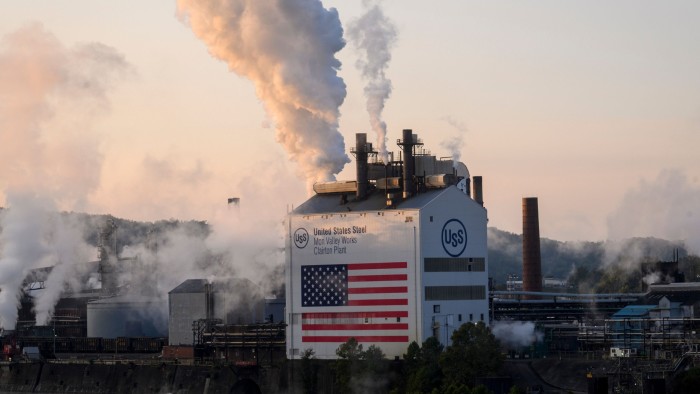Unlock the White House Watch newsletter for free
Your guide to what the 2024 US election means for Washington and the world
The Pentagon, US Treasury and state department have all concluded that Nippon Steel’s $15bn acquisition of US Steel poses no national security risks, even though President Joe Biden is expected to block the deal.
The conclusions come despite Biden’s insistence that the purchase of the Pittsburgh-based steelmaker poses economic and national security risks.
Critics say Biden made the determination for political reasons ahead of last month’s presidential election, in which Pennsylvania played a crucial role.
President-elect Donald Trump also opposes the deal, and has vowed to block it “immediately” once he returns to the White House in January.
Four people familiar with the situation said US trade representative Katherine Tai opposed the deal. One person said the US commerce department and energy department also had reservations.
The conclusions by the Pentagon, state department and Treasury are part of a review by the Committee on Foreign Investment in the US, an inter-agency panel chaired by the Treasury that vets inbound investments for security risks.
Deputy cabinet secretaries and top officials from the Cfius agencies will meet on Wednesday to debate the issue as the panel prepares to make a recommendation to the president ahead of a year-end deadline.
One person familiar with the discussions said the Pentagon, Treasury and state department had not issued final opinions, and that the issue would be debated on Wednesday and in the run-up to the December 23 deadline.
Several senior officials have told the Financial Times that the deal presents no national security risks and that Biden’s opposition was political.
“There is no credible analysis in the inter-agency that supports Biden,” said one former US official familiar with the internal debate.
Several people close to the process said Biden would almost certainly block the deal regardless of Cfius. But a Cfius conclusion that it posed no risks would force him to find alternative mechanism to block the transaction.
The acquisition, which was unveiled in late 2023, has become ensnared in US politics. Biden — followed by vice-president Kamala Harris — and Trump opposed the deal in what was viewed as an effort to attract blue-collar votes in November’s presidential election.
Cfius completed a review in September that concluded that the deal posed national security risks that could not be mitigated — a result critics said was tailored to facilitate Biden’s political stance. But the finding was not formally sent to Biden who granted a 90-day extension of the review.
The Pentagon, Treasury and USTR declined to comment. The state department and commerce department did not respond to a request for comment.
The White House stressed that Biden had always said US Steel should be domestically owned and operated but that the review was ongoing.
“The president will continue to see what the Cfius process yields. We have not received any Cfius recommendation,” said the National Security Council.
United Steelworkers, a powerful union that opposes the deal and whose president David McCall is close to Biden, on Tuesday called on the president to formally reject the deal.
“President Biden understands the stakes, and he promised to have workers’ backs,” McCall wrote to members. “Now it’s time for him to formally block the deal.”
As the Cfius deadline approaches, Nippon is making a last-gasp effort to rescue the deal. Takahiro Mori, its vice-president and lead negotiator visited Washington this week and is heading to Pennsylvania. On Monday, Nippon told workers at US Steel that it would give each employee a $5,000 closing bonus if the deal went through.
Nippon pushed back against McCall, saying it was “inappropriate that politics continue to outweigh true national security interests”. People close to Nippon have warned that a clearly political decision would increase the odds of Nippon taking legal action.
Some close observers said one reason Biden would be very unlikely to reverse course was that he was aware that Trump had vowed to block the deal and could overturn any approval. But others suggested that Trump might try to extract a better result for the union workers and then claim credit for a deal.
Japanese Prime Minister Shigeru Ishiba has urged Biden to approve the deal, taking a more assertive public stance than his predecessor Fumio Kishida. Japanese government officials said Ishida was conscious that time was running out, but that he was also more prepared to speak his mind and lobby the US for the deal to be approved.
Additional reporting by Maria Heeter and Taylor Nicole Rogers in New York and Harry Dempsey in Tokyo
Source link









